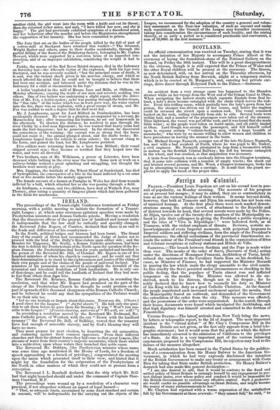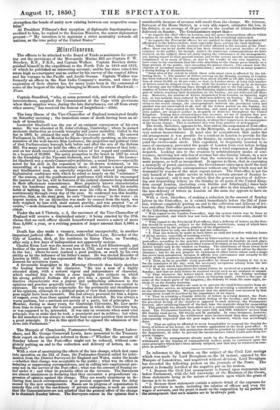furtigu an Colonial.
Fasarca.—President Louis Napoleon set out on his second tour in pur- suit of popularity, on Monday morning. The accounts of his progress are at present but meagre ; it may be added, they are as contradictory in tone as are the various feelings of their writers. It seems beyond doubt, however, that both at Tonnerre and Dijon his reception has not been one of unmixed homage. At the first place there were such marked demon- strations among the artisan crowd, of attachment to the Republic an of distrust towards its head, that several arrests were made by the Police.. AtDijon, tyrelve out of the twenty-five members of the Municipality re- fused to join their colleagues in giving the President a public reception; and the cries of " Vive la Repubhque ! " were bellowed forth, as at Tonnerre, with the violent emphasis of threats. Reviews ecstatic ac- knowledgments of every Imperial memento, with perpetual largesses to Imperial soldiers and suffering civilians, form the staple of the President's performances ; the official enthusiasm of the provincial functionaries se- conds the ardour of the President's real friends in the organization of fetes and eclatant receptions at railway stations and Hotels de Ville.
Smorma.—The breach between Sardinia and the Pope is made wider than ever. The monks of the order of Berri, (Servants of God,) acting) under the directions of Monsignor Franzen; Archbishop of Turin, lately refused the sacrament to the Cavaliere Santa Rosa on his deathbed, be- cause, as Minister of Finance, he had supported the Minister Siccardi in passing the law which made the clergy amenable to the civil courts. In this cruelty the Servi persisted under circumstances so shocking to the public feeling, that the populace of Turin almost rose and inflicted vengeance on the monks. The Minister was allowed to die un- shrived, much to his distress, though not to his despair; for he nobly declared that he knew how to reconcile his duty as Ministen of lus King with his duty as a good Catholic Christian. At the funeral the people manifested such increased excitement against the monks, that the Municipality feared an outbreak, and demanded of the Government the extradition of the order from the city. This measure was effected, and the possessions of the order were sequestrated. Li the search through their house, documents were found which inculpated the Archbishop, and that high dignitary was himself arrested and committed to the fortress of Fenestrelles.
UNITED SmrEs.—The latest: arrivals from New York bring the news, by letters or telegraphic report, to the 2d of August. The most important
incident is the "virtual defeat" of Mr. Clay's Compromise Bill in the Senate. Details are not given, as the fact only appears from a brief tele- graphic statement ; but it would seem that the point on which the failure has immediately occurred is the admission of California to the privileges of a State. As this is a very important part of the various balancing enactments proposed by the Compromise Bill, its rejection may lead to the failure of the measure altogether.
Much satisfaction has been caused in the United States by the publica- tion of a communication from Sir Henry Bulwer to the American Go- vernment, in which he had very expressly disclaimed the intention of the British Government to make any treaty or arrangement with Costa Rica for taking that State under British protection. Sir Henry Bulwer's despatch had also made this general declaration- " I am also desired to add, that it would be contrary to the fixed and settled policy of Great Britain to entangle herself by any engagement to pro- tect distant states, over whose policy and conduct it would be impossible for the British Government to exercise any effective control. Such a protector- ate would confer no possible advantage on Great Britain, and might become the source of many embarrassments to her." Mr. Clayton had rejoined with a warm expression of the satisfaction felt by his Government at these avowals : "they cannot fail," he said, "to strengthen the bonds of amity now existing between our respective coun- tries."
At President Fillmore's first reception of diplomatic functionaries ac- credited to him, he replied to the Russian Minister, the senior diplomatist present—" My intention is to maintain a strict neutrality towards all nations, as the true policy of the United States."



























 Previous page
Previous page